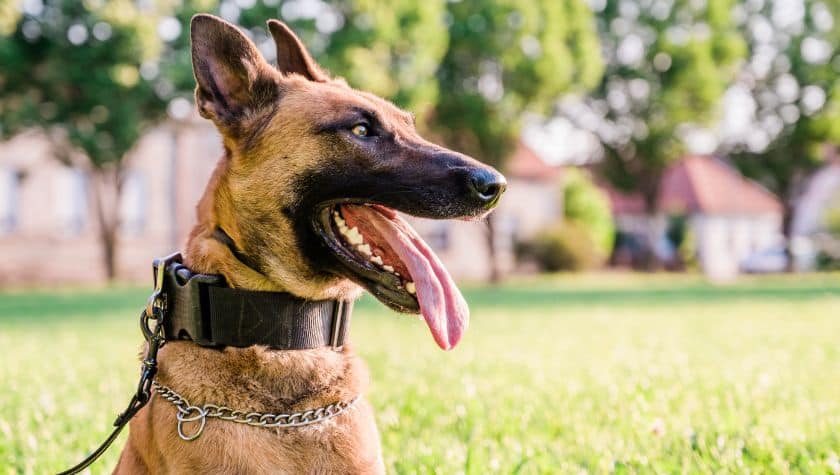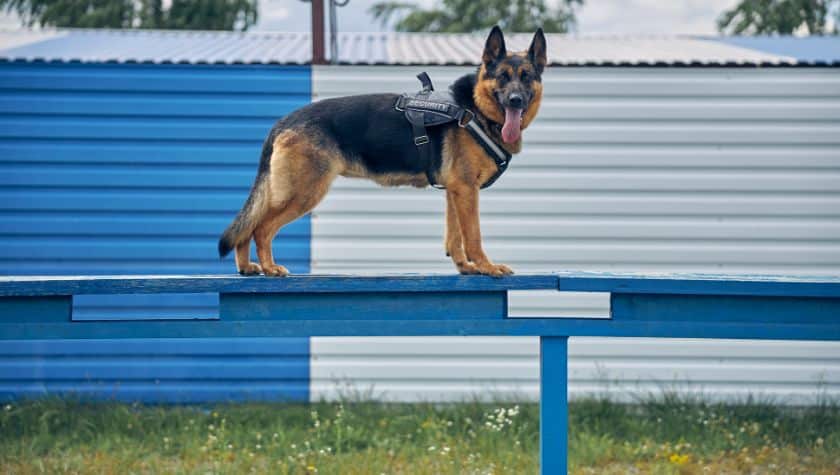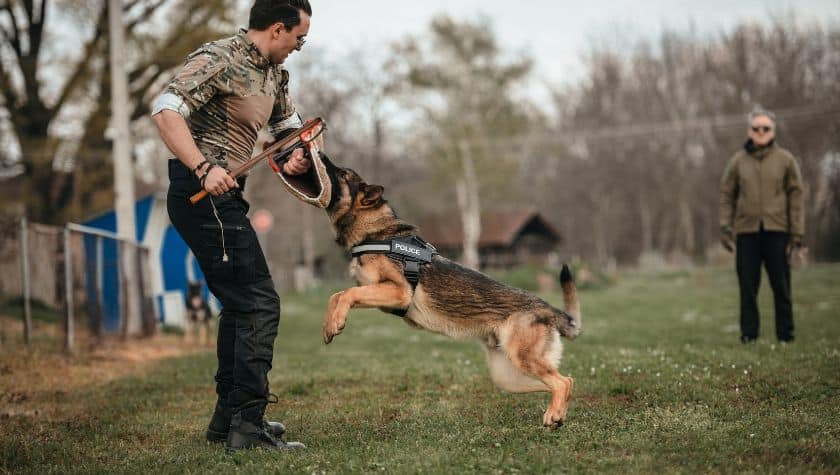
Introduction: Police dogs play a crucial role in law enforcement in the United Kingdom, serving as loyal and highly trained companions to their handlers. These remarkable canines possess a range of specialized skills and are selected from specific breeds known for their intelligence, strength, and agility. In this article, we will explore the fascinating world of police dogs in the UK, delving into their breeds, training methods, responsibilities, living arrangements, and more.
Police Dog Breeds:
The UK police services primarily rely on several breeds for their police dog units. Each breed possesses unique characteristics that make them well-suited for various tasks. Some common police dog breeds in the UK include:
a) German Shepherds: Known for their versatility, intelligence, and loyalty, German Shepherds are the most popular breed in police work. They excel in tracking, search and rescue operations, apprehension of suspects, and crowd control.
b) Belgian Malinois: These agile and high-energy dogs are valued for their speed, endurance, and determination. Belgian Malinois are often utilized in tracking criminals, detecting explosives or narcotics, and protecting officers.
c) Springer Spaniels: Renowned for their exceptional scent detection abilities, Springer Spaniels are frequently employed in locating drugs, firearms, and explosives. Their small size and sharp senses make them adept at searching confined spaces.
d) Labrador Retrievers: Highly intelligent and sociable, Labrador Retrievers are commonly used as sniffer dogs due to their exceptional sense of smell. They are instrumental in locating drugs, accelerants, and missing persons.
Training Police Dogs:
Training police dogs in the UK is an extensive and specialized process. Dedicated officers, of varying police ranks, work with both the dogs and their handlers to ensure effective teamwork. The training involves obedience, agility, scent detection, suspect apprehension, and search techniques. The dogs learn to respond to verbal and visual cues, navigate obstacles, and follow scent trails. The training process emphasizes positive reinforcement and rewards to reinforce desired behaviors.

How old are police dogs when they start training?
Training police dogs in the UK is an extensive and specialized process that begins when the dogs are still young. The exact age at which they start training can vary, but it generally occurs between the ages of 12 to 24 months. This age range allows the dogs to develop physically and mentally before they embark on their training journey.
Before police dogs begin their formal training, they go through an important phase known as “puppy walking.” This phase involves housing the young police pups with carefully selected families who provide them with a nurturing environment and essential socialization experiences. The purpose of puppy walking is to expose the dogs to various people, environments, and everyday situations, helping them develop a well-rounded temperament and adaptability.
During this period, which typically lasts several months, the police pups live in a family home rather than in a kennel or training facility. This arrangement allows them to experience life as a household pet, interacting with different family members, including adults, children, and other pets. By being exposed to diverse household routines, noises, and activities, the puppies become accustomed to a wide range of stimuli that they may encounter during their future police work.
How to get a job training police dogs?
To pursue a career in training police dogs, individuals typically need a strong background in dog training and handling. Many trainers have prior experience working with dogs in fields such as obedience training, search and rescue, or military roles. Most trainers have previous law enforcement experience, which provides them with a deeper understanding of the demands of police work.
If you aspire to work with police dogs, the first step is to join your local police service, as recruitment for police dog handlers primarily occurs from within the ranks of the existing police force.
What methods are used to train police dogs?
Training police dogs involves a combination of techniques and methods aimed at developing the necessary skills for their specific roles. Positive reinforcement is a fundamental approach used in training, where desired behaviors are rewarded with treats, toys, or praise. This method encourages dogs to associate specific actions or commands with positive outcomes.
Police dog training also encompasses obedience training, agility exercises, scent detection training, and controlled aggression work. The dogs are taught to follow verbal and visual cues from their handlers, respond to commands promptly, navigate obstacles, and track scents. Advanced training includes suspect apprehension techniques, where dogs learn to safely detain and control suspects under the guidance of their handlers.
During the training process, close cooperation between the dog and its handler is fostered. The handlers play a crucial role in reinforcing the training and building a strong bond with their canine partners, ensuring effective teamwork in real-life operational scenarios.
What happens to police dogs that fail training?
If a police dog fails to meet the training standards or does not exhibit the necessary temperament or aptitude for police work, alternative career paths are explored. Some dogs may be rehomed with suitable families as companion pets, while others may be transitioned into roles such as search and rescue dogs or therapy dogs. The well-being and best interests of the dog are always considered when determining their future after failing training.
In conclusion, training police dogs is a meticulous process that combines various training techniques and methods to develop their specialized skills. Trainers with relevant experience in dog training and handling, often including a background in law enforcement or related fields, play a crucial role in preparing these remarkable canines for their vital roles in law enforcement.
What Rank is a Police Dog Handler?
The handler of these dogs can be of any Police Rank. You will usually find that the rank of Police Constable is what the majority of handlers will be, plus then you will have a Police Sergeant who is in charge of a section of police dogs and handlers.
Responsibilities of Dogs once they complete training:
Police dogs perform a wide range of tasks to support law enforcement efforts. They are skilled in tracking suspects, locating missing persons, searching for evidence, detecting drugs or explosives, apprehending criminals, and providing public order and crowd control. These dogs serve as an invaluable asset in operations such as search and rescue, counter-terrorism, and dugs enforcement.
Living Arrangements:
Police dogs in the UK typically live with their assigned handlers. The strong bond between the dog and handler is crucial for effective teamwork. Handlers ensure the well-being, health, and regular exercise of their canine partners. Police dog units may also have kennel facilities on-site to accommodate dogs when their handlers are off-duty.
Retirement for Police Dogs:
After years of dedicated service, police dogs in the UK are rewarded with a well-deserved retirement. Retired police dogs often continue to live with their handlers or are placed in loving homes through rehoming programs. These loyal and trained canines can enjoy their golden years, free from the demands of active duty.
Common Police Dog Names:
Police dogs in the UK are given a variety of names, ranging from strong and commanding to friendly and approachable. Some popular names for police dogs include Max, Rex, Bruno, Diesel, Luna, Bella, and Shadow.
Police Dogs for Adoption:
In certain cases, retired police dogs may become available for adoption. These dogs make excellent companions for experienced dog owners who can provide the care and attention they require. Organizations such as the Retired Police Dog Benevolent Fund work to facilitate the adoption process and find suitable homes for retired police dogs.
Compensation for Police Dogs:
While police dogs do not receive monetary compensation, they are provided with exceptional care, including food, veterinary services, and training. Their well-being is of utmost importance to the police force, recognizing their invaluable contribution to public safety.
The Origin of the term “K9”:
The term “K9” is derived from the word “canine,” which refers to dogs. The letter “K” stands for “kennel,” and “9” represents the phonetic sound of the word “canine.” The term “K9” is commonly used to refer to police dogs and has become a widely recognized symbol for law enforcement canines.
Diet of dog in Police Training:
Police dogs have specific dietary requirements to support their active lifestyle. They are typically fed high-quality, nutritionally balanced dog food that meets their energy needs. The diet may include a combination of dry kibble, raw food, and supplements as recommended by veterinarians.
Arresting Abilities of Police Dogs:
Police dogs do not possess the legal authority to arrest individuals. Instead, they assist officers by locating and apprehending suspects. Once a police dog has located a suspect, officers take over the situation to ensure a lawful arrest.
What to Do if a Police Dog Chases You?
If a police dog is chasing you, it is essential to remain calm and avoid any sudden movements. Running away can trigger the dog’s prey drive, potentially leading to a confrontation. Instead, it is best to stand still, remain quiet, and avoid direct eye contact. Cooperate with police officer instructions and allow them to handle the situation professionally.

Conclusion:
Police dogs in the UK are highly trained, dedicated, and indispensable members of the UK Police Service. Their unique abilities and unwavering loyalty contribute significantly to maintaining public safety. Through their rigorous training, these remarkable canines work alongside their handlers to protect communities, locate suspects, and detect illicit substances. The bond between a police dog and its handler is a testament to the extraordinary partnership between humans and animals in the pursuit of justice.











